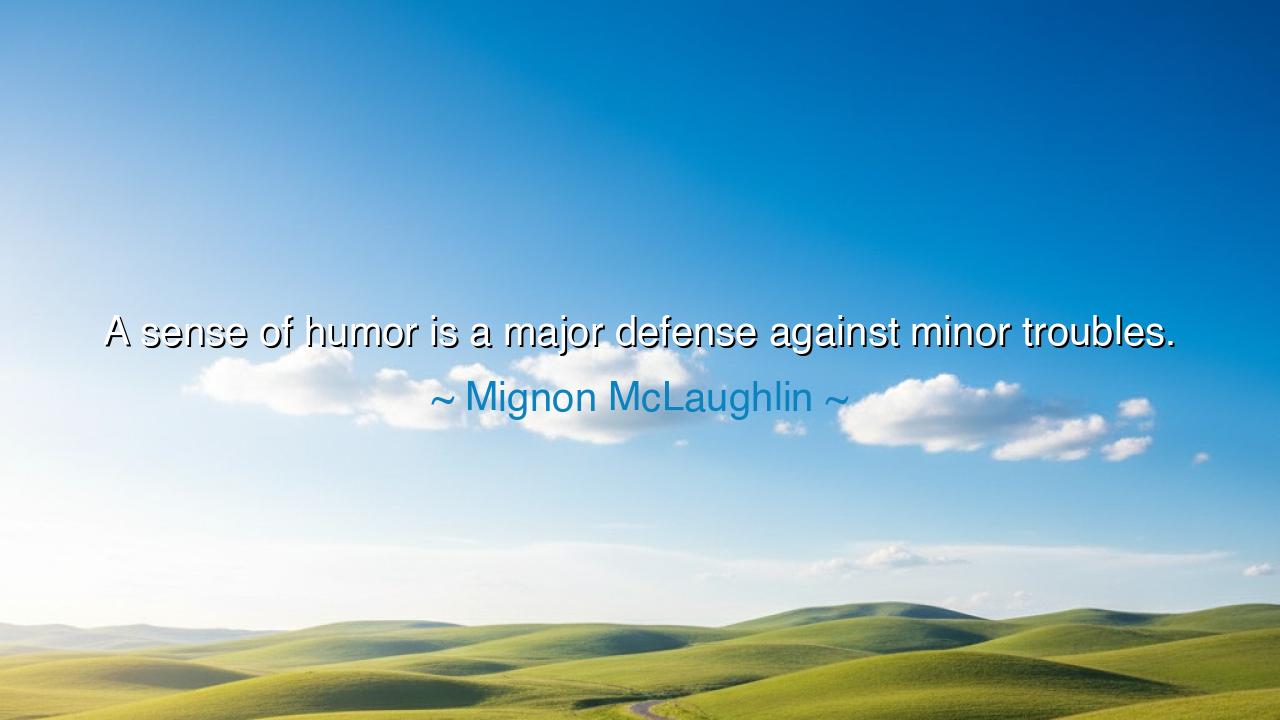
A sense of humor is a major defense against minor troubles.






In the gentle wisdom of the heart and the quiet strength of the spirit, Mignon McLaughlin, the American journalist and philosopher of life’s subtleties, once wrote: “A sense of humor is a major defense against minor troubles.” Though her words are wrapped in simplicity, they carry the timeless grace of truth — that laughter is not weakness, but resilience; not frivolity, but wisdom in disguise. For it is not the absence of difficulty that defines the strong, but the ability to meet life’s irritations with calm and cheer, to rise above small misfortunes with a smile rather than a sigh.
McLaughlin, who lived through the turbulence of the twentieth century, wrote with the insight of one who had seen both the weight of human sorrow and the healing power of wit. In her world — as in ours — people faced constant trials: disappointments, misunderstandings, weariness, and the thousand small wounds of living. Yet she saw that humor was the spirit’s armor — light, but unbreakable. Where others would fume or despair, the person who can laugh has already won half the battle. Her words remind us that life’s lesser storms need not drown us; they need only be danced through, with grace and wit as our companions.
To call a sense of humor a “major defense” is to recognize it as a form of courage. The one who laughs at misfortune does not deny its presence but denies it the power to control their heart. When we laugh at life’s inconveniences, we reclaim mastery over them. The ancient Stoics would have called this the highest form of self-command — to see trouble clearly, yet not be conquered by it. Minor troubles — the delays, the mistakes, the misunderstandings — are constant companions of mortal existence. But those who can meet them with laughter travel lighter, while those who carry them as burdens soon bend beneath their weight.
Consider the great example of Abraham Lincoln, a man who bore the heaviest of sorrows — the pain of war, the criticism of nations, and the loss of his own child — yet who wielded humor like a lantern in the dark. Once, when accused of being two-faced, he quipped, “If I were two-faced, would I be wearing this one?” His laughter did not come from arrogance, but from understanding. He saw that anger achieves little, and self-pity achieves less. In humor, he found both humility and endurance. His ability to laugh in the face of grief was not folly; it was wisdom — the recognition that to remain human in hardship, one must never lose the ability to smile.
Mignon McLaughlin’s insight touches upon a great spiritual truth: that laughter is an act of freedom. It is the soul’s refusal to be enslaved by circumstance. Where the bitter see insult, the wise see irony; where the fearful see disaster, the joyful see absurdity. To laugh at life’s imperfections is to acknowledge that we are imperfect too, and that this is not tragedy but part of the design. It is a way of aligning oneself with the rhythm of the universe — to accept the flow of events, to find beauty even in the stumble. As the ancients taught, “He who laughs at himself never runs out of things to laugh at,” and thus never loses peace.
There is also tenderness in McLaughlin’s teaching. She reminds us that humor heals — it lightens the load not only for ourselves, but for those around us. A shared laugh turns strangers into allies, defuses anger, and reminds us of our shared frailty. Even in hardship, laughter keeps the human bond alive. It is the gentle voice that says, “We are in this together,” and in that togetherness lies strength. The one who can make others laugh in difficult times is a quiet kind of hero — one who restores hope without preaching it.
So, dear reader, take this lesson into your own life: learn to laugh often, and wisely. When faced with small troubles — the missed train, the spilled coffee, the harsh word — let laughter rise instead of complaint. Train your spirit to see comedy where others see calamity. When you stumble, smile; when life mocks you, laugh back. This is not denial, but transcendence. For every laugh that springs from understanding weakens the hold of anger and fear.
And thus, remember always the truth of Mignon McLaughlin’s words: humor is a shield for the soul. It is the defense that turns wounds into wisdom, burdens into stories, and trials into lessons. To laugh is to live lightly — not carelessly, but courageously. Let your laughter be your light through life’s dim corridors, and you will find that even the smallest joys, when seen with humor, are enough to conquer the darkest days.






AAdministratorAdministrator
Welcome, honored guests. Please leave a comment, we will respond soon